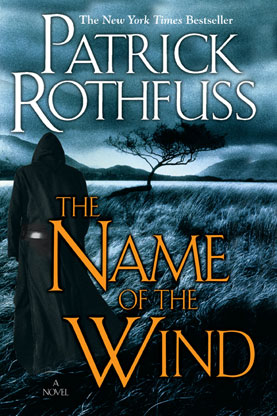I know that the name of fantasy has been somewhat defaced by the emergence of books
such as Twilight (I apologize if I’m offending anyone with this statement) and various other dark “romance” books whose only selling point is that they take advantage of the teenage girl’s tendency to be attracted to supernaturally sexy/bad boy personalities.
Then, after walking into Chapters and seeing an entire section of books devoted to shallow and content-less stories about vampires/werewolves/necromancers, etc… etc…, I was on the verge of abandoning all hope of ever finding another good fantasy read. That is, until The Name of the Wind restored my faith in the genre again. If you’re looking for a solid fantasy novel, I am pretty much begging you to give this book a try.

Like many epic fantasy novels out there, the book takes place in a world in turmoil. There are rumours of an ongoing war, and few travelers dare to brave the open roads. It is here that a man known as the Chronicler ventures out, seeking to reveal the story of Kvothe (pronounced “Quothe”), a legendary hero who everyone believes to be dead. He finds Kvothe posing as an innkeeper in a shoddy town on the outskirts of society, and convinces him to tell his story. Despite his initial reluctance, Kvothe eventually relents, but requests that he be given three days to tell his story, thus setting up the trilogy structure of the books.
This is where the similarities end. As soon as Kvothe begins his story, readers are immediately whisked away from their present-day world and absorbed into that of Kvothe’s. Patrick Rothfuss literally builds an entirely new world from the ground up. His carefully thought out system of magic is a novel mix of chemistry, physics and voodoo, a combination that he so brilliantly develops that it borders on the believable. Rothfuss’ narratives are so smooth and seamless that at times his words seem more like poetry than prose. Kvothe’s story unfolds in a first person narrative, a style of writing that allows the reader to really connect with the story’s main protagonist.
Kvothe spends his childhood in blissful happiness with his father’s performing troupe. Along the way, the troupe picks up an an Arcanist, Abenthy, who teaches him the basics of magic and instills in him the idea to attend the famed University to further develop his abilities. After Abenthy departs, Kvothe’s troupe is brutally murdered by the Chandrian, evil creatures that many believe only to exist in fairytales. Kvothe, the lone survivor, then makes his way to the nearest city, Tarbean, where he spends three years living as a street urchin. At 15, he finally makes his way to the University, where his training under Abenthy gets him enrolled. Here, Kvothe makes friends and enemies, meets his first love, and continues his quest to discover more about the Chandrian.
Throughout it all, Rothfuss keeps the novel grounded, as not only is he gradually unfolding the story of a legendary hero, he is also telling of the transformation of a naive, insecure boy into a worldly adult. If you’re looking for an accessible, not to mention breathtaking, novel, try this book. You won’t regret it.
